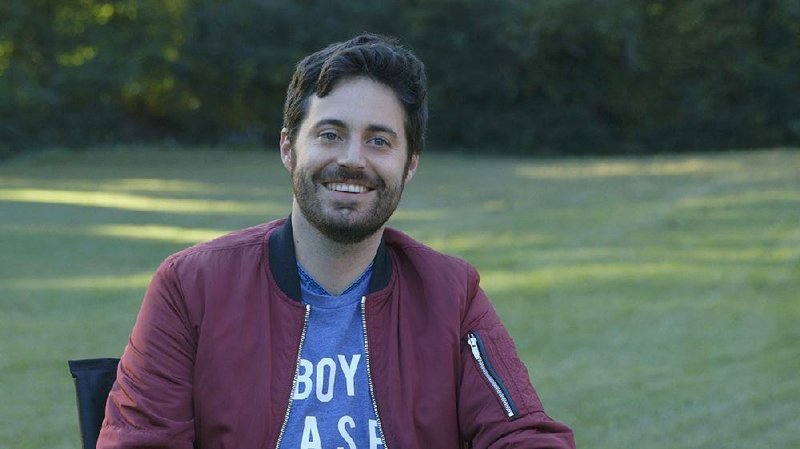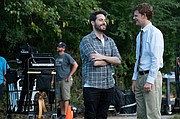In 2004, when he was 19 years old, they told Garrard Conley he was all wrong.
His father told him if he acted on his feelings, he could never set foot in the family home again. So he went to Memphis. He surrendered his phone, wallet and the notebook in which he made notes for the short stories he planned to write and entered a faith-based program called Love in Action, which promised to cure his homosexuality.
Conley was ready to try it because he'd grown up in a small town northeastern Arkansas, the son of a car dealer/Baptist preacher, in an environment where the literal interpretation of the Bible was a consensus view.
He'd already survived a sexual assault. He was desperate not to go to hell.
Things didn't get better in Memphis. At one point his "treatment" included being beaten with a Bible by members of his family. But the therapy, long discredited by the American Psychological Association, didn't work.
Conley wrote about his year in the LIA program in his 2016 memoir Boy Erased, which was adapted by Australian actor-director Joel Edgerton (The Gift and Jeff Nichols' Loving). The film opened in Arkansas on Friday.
Oscar nominee Lucas Hedges (Manchester by the Sea) plays Jared Eamons, who is modeled after Conley, while Edgerton plays Victor Sykes, who's based on John Smid, the director of LIA during Conley's time there.
Smid, it is worth noting, has been married to his husband since 2014. He has apologized for the harm caused by his ineffective therapy and now leads Grace Rivers, a ministry for gay Christians. (On a particularly poignant moment in a recent episode of the podcast Unerased: The History of Conversion Therapy in America, Smid listens as the names are read of nearly a dozen LIA alumni who have committed suicide.)
After reading Conley's book before seeing Edgerton's film, it was striking how the rules and practices at LIA that seemed eerie and weird became horrifying on the big screen. The clothing the teens wore there made them look like members of Warren Jeffs' Fundamentalist Church of Jesus Christ of Latter-day Saints; the intrusive conditions and sadistic practices seem more painful when they are seen on screen.
"When you're writing a memoir, you have room to sort of meander or add some extra padding or context," Conley says from his home in New York. "Whereas, in film there's a more objective sense of the event happening. Usually, you play straight through a scene without interrupting it, so there's no relief for the audience watching it."
According to the LIA materials, being lousy at sports was considered a sign of potentially being homosexual.
"They were aligning gender and sexuality, and those two things are very different," Conley says. "The expression of gender is not necessarily tied to your sexuality, and as my mom Martha [played by Oscar-winner Nicole Kidman] said at the end of the film, 'What are your qualifications to teach this?' The one person who responded to her said, 'Well, I'm a marriage counsellor.'
"They were just really shoddy. It almost makes me wonder why I ever agreed to it because obviously these weren't the smartest people in the world. At the same time, it was the kind of writing that I encountered in church.
"It's easier to talk about all these experiences in the context that I now have. I had a law firm, the Mattachine Society of Washington, D.C. [look through] all the material that I provided them from my handbook from John Smid. They told me point blank, 'This was a cult.'
"I know this shouldn't have been shocking to me, you look at those rules in the handbook or in the beginning of the movie, and it's hard not to think that's bizarre, but I was also being told that a lot of my upbringing had cultlike ideas in it as well and that was shocking."
The treatment was crushingly expensive. Clergymen, like Conley's father, Hershel, generally don't have much cash to spare.
"My parents didn't have a lot of money. [LIA cost] about $1,500 a week. They wanted my parents to pay the same tuition that a year of my college would have been if I had stayed for a full year," Conley says.
FIRST IMPRESSIONS
Conley's parents come off as sympathetic in his book and in the film.
In print, his father, played by Oscar-winner Russell Crowe on film, survives an alcoholic, abusive father and a traumatic accident. Both Conley and, in the film, Jared, rebel when their therapists tell them to berate an empty chair representing the father because their relationship to that point had been consistently loving. While Conley's openness about his sexuality put a strain on their relationship (Hershel still preaches in Mountain Home), Hedges recalled in a recent NPR interview that he had attended their church and even had dinner with Conley's mother and father.
"I tried really hard to humanize my father because I didn't want [the book] to be a sort of expose or an excoriating, angry narrative," Conley said.
How has Conley's faith changed since his experiences?
It's "complicated, as you can imagine. I still believe in God. I still align myself with Christianity because that's what I really know. I don't think dogmatically like I used to. Whenever I pray, I no longer pray for something to change. I prayed for myself to change and it didn't work. I pray instead because I'm grateful for something. I think that's more what I'd want to hear if I was God."
Conley notes that while the film accurately captures local hairstyles and attitudes, he wants outsiders to know Arkansas is more sophisticated than outsiders generally acknowledge.
Despite the work of people like Mel White, the founder of Soulforce, a gay Christian ministry (and father of actor-writer-director Mike White), Conley says "churches tend to ignore my message." Of a church that is particularly supportive of LIA, Conley says: "I've called out Bellevue Baptist Church in Memphis in at least 17 interviews, and they've never said a word. I find that interesting."
THE OUTSIDE VIEW
Edgerton shot the movie in Georgia. Hedges originally hails from New York. The director, who also wrote the script, is also one of two Australians (Edgerton and Kidman) in the cast. Crowe was born in New Zealand and has lived most of his life in Australia.
Asked why he's happy he trusted his book to a straight Australian actor, Conley says, "He was the only one knocking on my door and he was interested. I think it's because he's fascinated with the idea of bullying. If you look at his first film [The Gift], it has that.
"I think that there's a rather myopic criticism that says straight people shouldn't direct LGBTQ films. I think we've had plenty of really great LGBTQ films that are directed by straight people and plenty of bad ones that are directed by gay men."
Style on 11/18/2018

